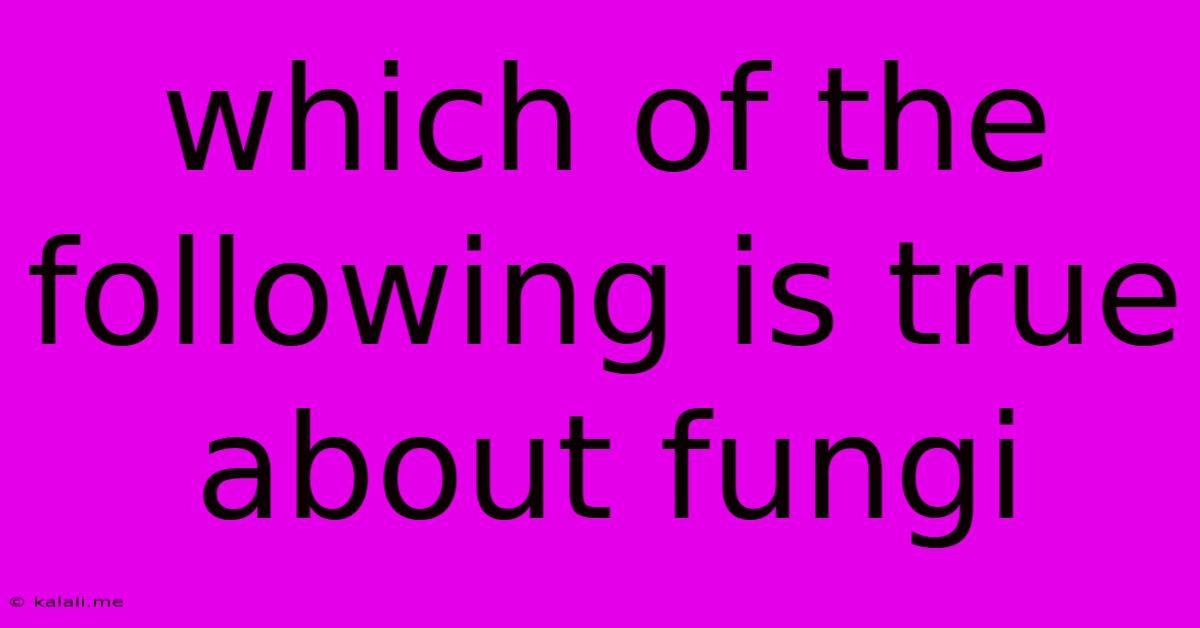Which Of The Following Is True About Fungi
Kalali
Jun 14, 2025 · 3 min read

Table of Contents
Which of the Following is True About Fungi? Decoding the Mycological Kingdom
Fungi. The word conjures images of mushrooms sprouting in damp forests, perhaps the fuzzy mold on forgotten bread. But the fungal kingdom is far more diverse and fascinating than these common examples suggest. This article will explore several common statements about fungi, clarifying which are true and delving into the incredible biology of this often-overlooked group of organisms. Understanding the unique characteristics of fungi is key to appreciating their ecological importance and their potential applications in medicine and biotechnology.
What Makes Fungi Unique? Separating Fact from Fiction
Many misconceptions surround fungi. Let's examine some common statements and determine their accuracy:
Statement 1: Fungi are plants.
FALSE. While fungi were once classified alongside plants, they are now recognized as a completely separate kingdom of life. Their cell walls are made of chitin, not cellulose like plants. Unlike plants, fungi are heterotrophic, meaning they cannot produce their own food through photosynthesis. Instead, they obtain nutrients by absorbing organic matter from their surroundings, either as decomposers, parasites, or symbionts. This fundamental difference in nutrition separates them decisively from the plant kingdom.
Statement 2: All fungi are multicellular.
FALSE. While many fungi, such as mushrooms and molds, are multicellular, many others exist as single-celled organisms called yeasts. Yeasts play crucial roles in processes like baking and brewing, showcasing the remarkable diversity within the fungal kingdom. The morphology of fungi, ranging from the macroscopic fruiting bodies of mushrooms to microscopic hyphae and yeast cells, highlights their adaptability and ecological versatility.
Statement 3: Fungi are essential decomposers.
TRUE. This is a crucial role fungi play in ecosystems worldwide. Their ability to secrete enzymes that break down complex organic matter, like dead plants and animals, is vital for nutrient cycling. Without fungi, the planet would be buried under a massive accumulation of organic waste. This decomposition releases essential nutrients back into the environment, making them available for other organisms. They are nature's recyclers, playing a critical role in maintaining healthy ecosystems.
Statement 4: Some fungi are beneficial to humans.
TRUE. Fungi have a long history of interaction with humans, both beneficial and detrimental. Many fungi are essential to various food and beverage production processes. Yeast, for example, is crucial in baking and brewing. Furthermore, certain fungi produce antibiotics, such as penicillin, which have revolutionized medicine. Mycorrhizal fungi, which form symbiotic relationships with plant roots, enhance nutrient uptake in plants, benefitting agriculture. The potential of fungi in biotechnology and medicine continues to be an area of active research.
Statement 5: All fungi are poisonous.
FALSE. While some fungi are indeed toxic and consuming them can be lethal, many are perfectly safe and even delicious to eat. Mushrooms, in particular, are a culinary delicacy in many cultures. However, it is crucial to exercise extreme caution when foraging for wild mushrooms, as identifying edible species requires significant expertise to avoid potentially fatal consequences. Misidentification can lead to severe illness or death.
Conclusion: The Fascinating World of Fungi
The fungal kingdom is remarkably diverse and vital to the planet's ecosystems and human society. From their role as decomposers to their applications in medicine and food production, fungi play a multifaceted role. Understanding the unique characteristics of fungi helps us appreciate their importance and the continued need for research to unlock their full potential. Always remember to approach unfamiliar fungi with caution, leaving identification to experts to avoid any risks associated with poisonous varieties.
Latest Posts
Latest Posts
-
Choose The Correct Option To Fill In The Blanks
Jun 15, 2025
-
How Many Pi Electrons In A Double Bond
Jun 15, 2025
-
When Conducting A General Survey Of A Client
Jun 15, 2025
-
What Is The Unit That Heat Is Measured In
Jun 15, 2025
-
1 Barrel Crude Oil In Litres
Jun 15, 2025
Related Post
Thank you for visiting our website which covers about Which Of The Following Is True About Fungi . We hope the information provided has been useful to you. Feel free to contact us if you have any questions or need further assistance. See you next time and don't miss to bookmark.